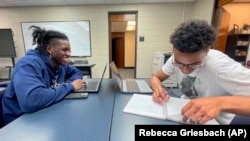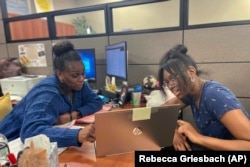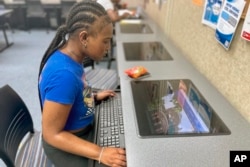Ten years after suspending her studies, Briana Mathis, a 30-year-old mother of two children, is in her first year back at Wallace Community College.
Support staff at the school in Dothan, Alabama, suggested she return to finish her studies. A school advisor checks regularly on her progress and also has helped Mathis with a financial aid issue.
“I definitely needed the guidance, and I probably wouldn’t have gotten this far without the guidance,” Mathis said.
Two-year community colleges have the lowest completion rates of any kind of university or college. They also serve many of the students who need the most support. Nationally, about 36 percent of community college students who began in 2018 graduated within three years. In Alabama, the rate is about 30 percent.
Students say that having advisors who can help them is often the most important influence on those who succeed.
In Alabama, several community colleges are trying new ways to help students through difficulties until they graduate.
Chattahoochee Valley Community College in Phenix City has started the Strategies to Enhance New Student Engagement program, or SENSE. Advisors contact students who are in remedial classes, in academic trouble, or in need of extra support for other reasons. The program is supported by a five-year, $1.8 million federal grant.
“We lose a lot of students because they don’t think they have solutions to their problems,” SENSE project coordinator Alisha Miles said.
Miles said the goal is for coaches to stay with students until they get a job or transfer successfully. They try to help students get past problems. Such problems can include lack of transportation, lack of money for books or a lack of family support.
“We’re trying to…put ourselves in the middle of those obstacles so that we can see higher completion rates,” she said. “But it’s still a difficult task because we’re fighting against a lot of things.”
Not all community colleges offer so much support, said Linda García of the Center for Community College Student Engagement. A 2022 CCCSE report found that nationally, 53 percent of students said an adviser helped them to set academic goals and create a plan for reaching those goals.
Jahnelle Congress, a first-year student at Lawson State Community College, said she needed help deciding on a major. However, her school’s advising program never answered her emails or requests.
“You need an adviser to help you figure out those things, and to not have that is kind of tough,” she said.
Deryl Hatch-Tocaimaza, an associate professor at the University of Nebraska-Lincoln, said funding is the biggest problem to “quality community college advising.” He added that it is difficult to find advisors who can work weekends and evenings. Those are the times many community college students attend classes.
In her first year at Chattahoochee Valley, Oryanan Lewis failed three classes as she struggled with a long-term illness.
She nearly lost her financial aid and likely would have had to quit, she said, without help. The new team of success coaches made a plan to help her keep her grades up. These grades would permit her to keep her scholarship. She is now close to graduation.
“If I didn’t go in there and get the information and the support that I had, I don’t think I would be where I’m at now,” she said. “I most definitely don’t think I would have been in school still.”
I'm Andrew Smith.
Rebecca Griesbach of AL.com wrote this story for The Associated Press. Andrew Smith adapted it for VOA Learning English.
_______________________________________________________________________
Words in This Story
graduate –v. to complete a course of study and to receive a document stating that fact from a school or college
remedial –adj. related to special help for students who need it
transfer –v. to go from being in on place or organization to another
obstacle –n. a barrier
figure out –v, (phrasal, idiomatic) to find out by thinking
_______________________________________________________________________
We want to hear from you.
We have a new comment system. Here is how it works:
- Write your comment in the box.
- Under the box, you can see four images for social media accounts. They are for Disqus, Facebook, Twitter and Google.
- Click on one image and a box appears. Enter the login for your social media account. Or you may create one on the Disqus system. It is the blue circle with “D” on it. It is free.
Each time you return to comment on the Learning English site, you can use your account and see your comments and replies to them. Our comment policy is here.









Forum